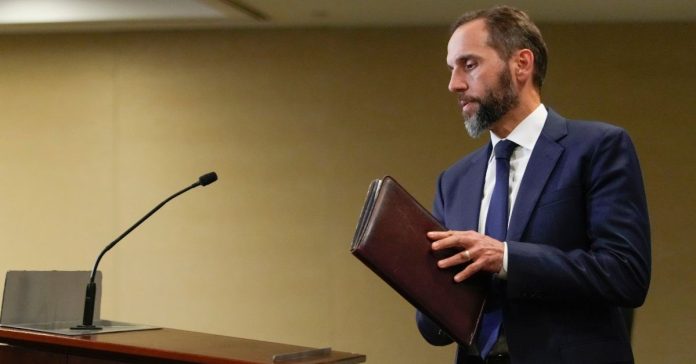
Special counsel Jack Smith arrives to speak about an indictment of former President Donald Trump, Aug. 1, 2023, at a Department of Justice office in Washington. (AP Photo/Jacquelyn Martin, File)
Urging a federal judge to disregard Donald Trump‘s latest attempt to cast off his indictment in Washington, D.C., for allegedly conspiring to overturn the 2020 election, prosecutors at the special counsel’s office argue Trump’s criminality “stands alone” in history and that even if he genuinely believed the 2020 election was stolen, he still used “fraud and deceit” as a means to achieve illicit ends.
Spread out over nearly 80 pages, the motion from special counsel Jack Smith sharply critiques Trump’s characterizations of the four-count indictment against him, which includes felony conspiracy to defraud the United States.
In recent weeks, Trump has sought to dismiss the indictment on various grounds, arguing that his belief that the election was “stolen” in 2020 justified his actions and words in the run-up to the congressional certification on Jan. 6, 2021.
That included, according to Trump, messaging targeting then-Vice President Mike Pence to stop the certification.
But prosecutors say Trump’s argument suggesting he was engaged in “permissible advocacy” of his conspiracy theories about a rigged or stolen election are utterly baseless upon inspection. Since Trump cannot argue the merits of his case, prosecutors wrote, his attempt to dismiss the indictment altogether on constitutional and/or statutory grounds “rely instead on distortions and misrepresentations.”
Trump, prosecutors continued, has wrongly attempted to “rewrite the indictment” by coloring his defense with suggestions that his conduct was justifiable because, among other reasons, he only targeted election officials who “were the most informed politicians on the planet” and would “come to their own conclusions” without relying on his assertions of rampant fraud.
“He is wrong,” prosecutors wrote Monday, “lack of success provides no defense to a charge of conspiracy to defraud, much less any basis to dismiss the charge.
In the U.S., a defendant does not have to pull off a conspiracy successfully to be convicted of participating in one or leading one.
“Were it otherwise, defendants captured en route to a bank robbery could not be charged with conspiracy because their crime did not succeed,” prosecutors wrote. “Indeed, a conspiracy can be committed even if the object of the conspiracy is unattainable.”
Special counsel also urged presiding U.S. District Judge Tanya Chutkan to reject Trump’s insinuations that his speech and conduct around Jan. 6 were “admirable” or that because others in the past had objected to election results through legitimate means, it excused his speech and conduct as alleged.
“[The] defendant stands alone in history for his alleged crimes. No other president has engaged in conspiracy and obstruction to overturn valid election results and illegitimately retain power,” Smith wrote.
Trump told “knowing lies” to subvert the 2020 election and “knowing lies are neither opinions nor pure advocacy,” the motion states.
“And in any event, the defendant could not use so-called advocacy as a cover for his scheme to obstruct a governmental function through deceit,” Smith continued. “Knowing deceit aimed at defeating a government function constitutes a violation of the defraud clause, notwithstanding his attempts to sanitize his conduct.”
The U.S. Supreme Court ruled in 1969 that even a claim of “unconstitutionality” will not be heard to excuse “voluntary, deliberate and calculated course of fraud and deceit.”
“Just as the president of a company may be guilty of fraud for using knowingly false statements of fact to defraud investors, even if he subjectively believes that his company will eventually succeed, the defendant may be guilty of using deceit to obstruct the government function by which the results of a presidential election are collected, counted and certified, even if he provides evidence that he subjectively believed that the election was ‘rigged’,” the motion states.
Trump should also not be able to argue that he is facing double jeopardy because he was impeached by the House of Representatives for incitement of insurrection, prosecutors argue. Trump was acquitted by the Senate and in his motions to dismiss the indictment in Washington, D.C. he has argued that the acquittal there made the indictment in federal court redundant.
But congressional impeachment penalties are civil, not criminal and the removal and disqualification that could come with an impeachment does not mean criminal charges are off the table later. Even if the person impeached was acquitted by one body of Congress and convicted by another.
Former associate Justice of the U.S. Supreme Court Joseph Story found in 1833 that the Constitution itself separated impeachment “with its exclusive remedies of removal and disqualification from a trial in the “common tribunals of justice” to ensure that “a second trial for the same offence could be had, either after an acquittal, or a conviction in the court of impeachments.”
Smith noted Story’s prescient guidance: “If no such trial could be had, then the greatest official offenders might escape without any substantial punishment, even for crimes which would subject their fellow citizens to capital punishment.”
Trump has pleaded not guilty to all of the charges he faces in Washington. With civil cases and criminal indictments in New York, Florida and Georgia as well, the former president faces a battery of nearly 100 charges.
Have a tip we should know? [email protected]

